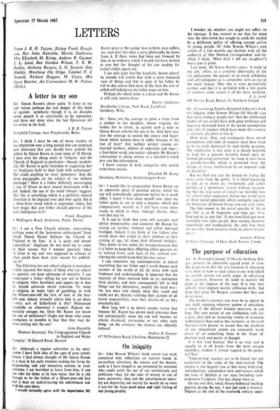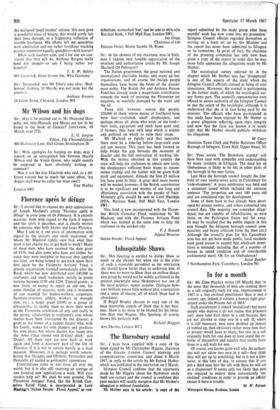The purpose of education
Sir: In 'Personal Column' (3 March) Anthony Bor- ges, presents an admirably argued point of view. His proposition that the real function of education is to show us how to read values is one with which no sensible person can justly argue. In advancing this argument, however, he tends to nurture the plant at the expense of the root. It is true that schools 'must implant mainly utilitarian skills,' but from that point Mr Burgess assumes that they can do no more.
The teacher's essential aim must be to impart to any child, enjoying whatever system of education, a sense of the delicate balance necessary in our lives. The very nature of our civilisation calls for a great deal and an increasing variety of mundane technological data and as this increases, so the need becomes even greater to ensure that the products of our educational system are constantly made aware of an underlying force in the shape of absolute truth and purity of thought.
It is this 'root balance' that is so vital, and is equally so at all levels—from the most meagre secondary modern C stream laggard to the poten- tial 'first.'
'Time-serving' teachers are to be found, but not exclusively in the ranks of the state-trained. The reverse is also happily true in that many dedicated, individualistic, independent men and women enrich the lives of children in our state (including com- prehensive!) schools. This has always been so.
On my own first, timid, theory-bolstered teaching practice during the war, I met just such a treasure Trained at the end of the nineteeth century under the maligned 'pupil teacher' scheme, this man gave a wonderful sense of beauty, that would surely last their lives through, to a frightening collection of lovable hooligans. His efforts left me speechless with admiration and my rather fastidious teaching practice supervisor equally speechless—with horror!
While such teachers exist, and I for one am con- vinced that they still do, Anthony Burgess really need not despair—or am I being rather too hopeful?































 Previous page
Previous page